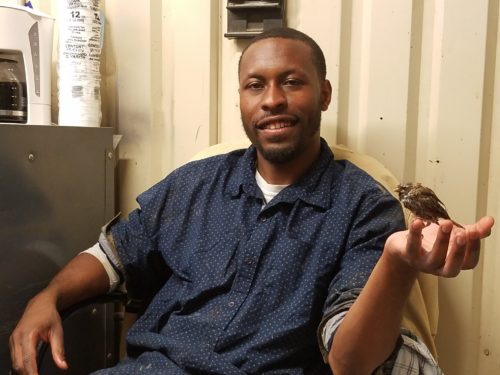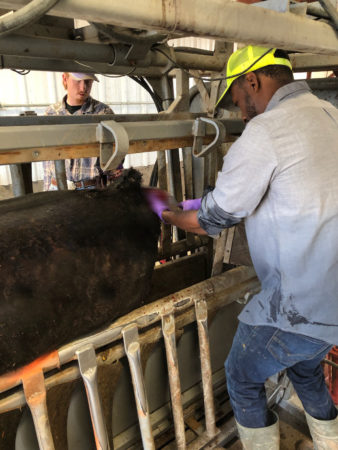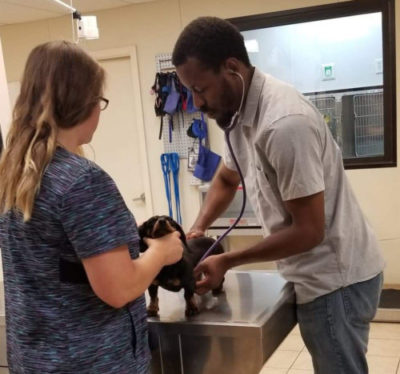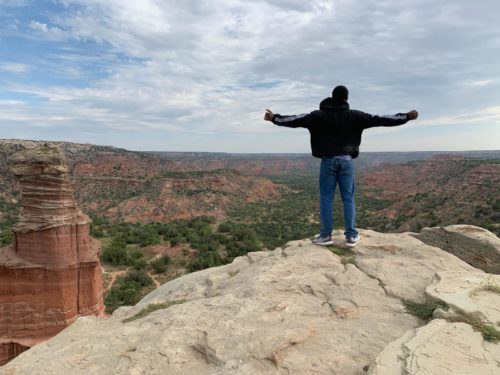Exploring Opportunities in the Texas Panhandle
Story by Dorian Martin

Growing up in Jamaica, Orville Tucker was surrounded by neighbors whose farms included goats, cows, chickens, dogs, and cats. A boyhood spent in close proximity to a wide variety of animals inspired Tucker’s decision to become a veterinarian.
“I always wanted to help animals since I was 12 years old,” he said. “I figured that if I was going to do anything for the rest of my life and call it work, it would need to involve animals because I wouldn’t enjoy anything else.”
Now a second-year veterinary student in Texas A&M University’s College of Veterinary Medicine & Biomedical Sciences (CVM), Tucker is learning the necessary knowledge and skills to pursue his dream career.
To apply the lessons he’s learned in the classroom, Tucker decided to dedicate this summer participating in the CVM’s innovative Veterinary Education, Research and Outreach (VERO) Food Animal & Rural Practice Summer Internship Program.
Through the internship program, VERO, a partnership between CVM and West Texas A&M University in Canyon, gives students a chance to explore another side of the veterinary profession, allowing interns to focus on working with either beef cattle, swine, or dairy cattle.
The Panhandle setting is ideal because of VERO’s close proximity to a significant percentage of the beef industry; approximately 30 percent of the nation’s beef cattle are raised within 200 miles of Canyon.

Putting Knowledge into Practice
Tucker already had studied beef cattle during his undergraduate classes at Texas A&M University-Commerce, but wanted to learn more. That led to him to a presentation by Dr. Dan Posey, clinical professor and academic coordinator for the VERO program.
“Dr. Posey described the summer internship program as being an experience that would change the path of your veterinary career,” Tucker said. “I knew I didn’t have that much background with large animals, farm life, and country life. I wanted to see if this was something I wanted to do.”
The internship, which involved working full-time during the week and from 8 a.m. to noon on Saturdays, gave him exactly what he was seeking.
Tucker spent a month at a Dalhart feedlot where he worked with the feedlot doctoring crew, pen riders to assess cattle health, feedmill staff, the yard/maintenance crew, and drivers who deliver feed.
The next four weeks of his summer were spent in a mixed animal practice in Plainview. This gave Tucker the opportunity to work with a mixed animal veterinarian and learn to interact with clients, assist with physical exams, and assist in surgeries.
Tucker found that his summer experience offered additional depth in working with large animals.
“This internship has challenged me to become more competent in talking to clients about dentals or vaccines,” he said. “It’s also given me practice in technical skills, such as scrubbing in for surgery and placing catheters, and critical thinking about what we want to do for our patients.”

Broadening Horizons
The VERO summer internship program also aligned with Tucker’s desire to fully explore his professional options.
“When I started veterinary school, I wanted to keep my mind open to everything,” he said, adding that his CVM coursework focuses on both large and small animals. “I think I’m going to stay with mixed animal medicine because I’ve gotten to learn more about these other species beyond just the cats and dogs that I grew up with. I really think I’d enjoy working with difference species of animals.”
He’s also experienced what it’s like to live in the Texas Panhandle.
“It’s a lot more spacious than I thought,” he said.
Tucker and his fellow Aggies have used their free time to explore the Panhandle, including West Texas A&M’s Panhandle-Plains Historical Museum and the TEXAS Outdoor Musical at Palo Duro Canyon.

Finding a Sense of Home
Tucker, who is now a U.S. citizen, plans to share his knowledge with his extended family and neighbors in his home country.
“Farm animals are important in Jamaica,” he said. “Having knowledge about how to work with farm animals will be important when I go back to visit family and friends.”
He also has been impressed with the area and could see why veterinarians would be drawn to the region.
“It’s nice; you definitely can make a life up here,” Tucker said, adding that he wants to continue to explore Texas before deciding where to put down roots. “I want to see more places and see where my experiences take me. At the end of it all, where the opportunity presents itself, I’ll go.”
###
For more information about the Texas A&M College of Veterinary Medicine & Biomedical Sciences, please visit our website at vetmed.tamu.edu or join us on Facebook, Instagram, and Twitter.
Contact Information: Jennifer Gauntt, Interim Director of CVM Communications, Texas A&M College of Veterinary Medicine & Biomedical Science; jgauntt@cvm.tamu.edu; 979-862-4216


